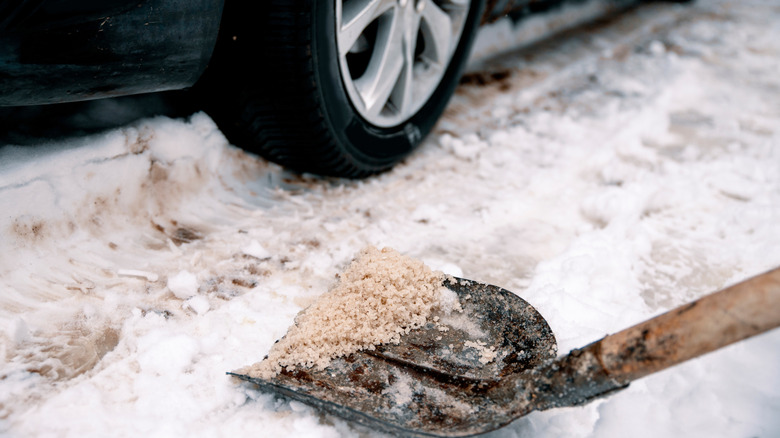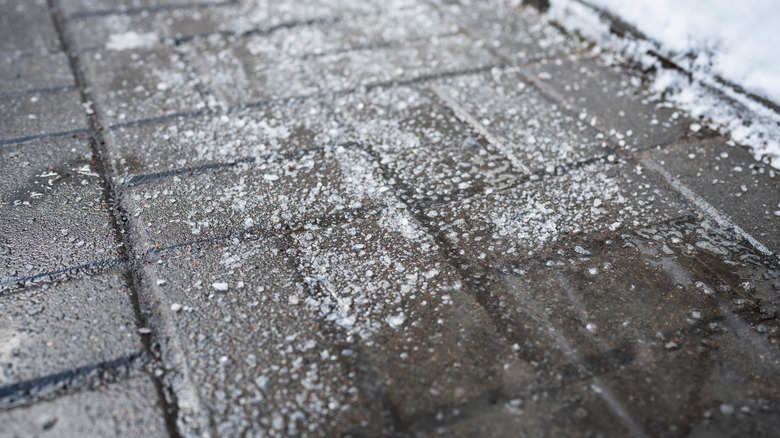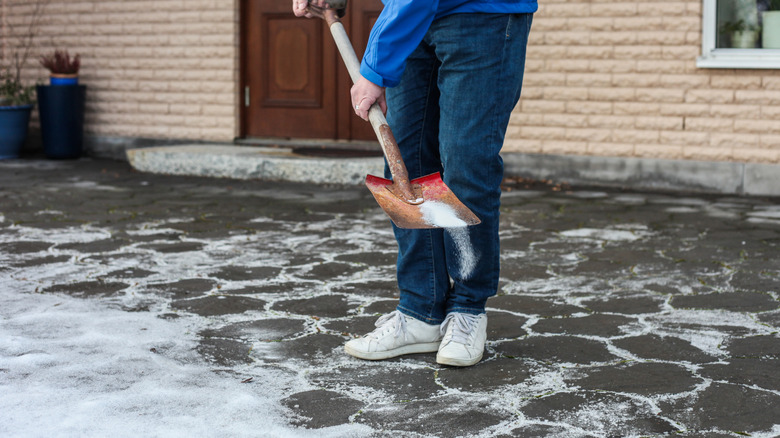4 Of The Best Road Salt Alternatives To Melt Ice
We may receive a commission on purchases made from links.
There is something magical about the beauty of a cold winter's morning until you step outside and discover that the driveway, roads, and sidewalks are effectively an ice-skating rink. Time to get the road salt out. However, road salt (sodium chloride) is not the kindest of chemicals. Although it's undoubtedly effective at melting ice, it can also corrode concrete and vehicles, cause harm to plants and pets, increase soil erosion, and have other environmental impacts. In short, there are plenty of reasons why road salt is a terrible idea.
The good news is that there are plenty of road salt alternatives that are worth considering. Which one works best for you will largely depend on your circumstances. For instance, calcium magnesium acetate is recognized as being less toxic to pets, whereas beet juice is often used to reduce the amount of salt required to de-ice surfaces. So, if you want to de-ice without oversalting, we have compiled a list of the best alternatives to road salt and how they can help make your surfaces ice-free and keep you safer in inclement weather.
Calcium magnesium acetate
Hailed as a pet-friendly alternative to road salt, calcium magnesium acetate (CMA) has been around since the 1970s and was developed by the U.S. Federal Highway Administration. Importantly, CMA is chloride free. Chloride is present in road salt and is a highly corrosive compound that can even cause corrosion on materials such as stainless steel, so using this can help protect your car from rust – which is a useful bonus. Of course, asphalt is another material that can be compromised by chloride.
The way CMA works is by affecting how snow and ice particles react to each other. Effectively, it acts as a binding inhibitor by preventing the particles from bonding with one another and also to the asphalt. The less-compact nature of the treated ice offers greater traction, melts quicker, and is easier to clear from roadways. Commercially available versions like Safe Paw are effective down to minus 26 degrees Fahrenheit (minus 15 degrees Celsius) and are completely salt and chloride-free.
Magnesium chloride
Although this isn't a chloride-free alternative to road salt, it does significantly reduce the amount of chloride needed to melt ice. Somewhat ironically, magnesium chloride contains a larger concentration of chloride than sodium chloride. The reductions are made because the compound is more effective at de-icing, and therefore less of it can be used for the same results. The upshot is that if it's applied correctly, magnesium chloride levels can be reduced by 20-35%. While magnesium chloride is often sold as and is regarded as being safer for pets than sodium chloride, it can cause a range of ailments if ingested in enough quantities. So, some caution in the presence of pets is still required.
Like most chloride-based de-icers, magnesium chloride works by lowering the freezing point of water. This, in turn, prevents the ice and the road surface from bonding. The product can be bought in pellet form, flakes, or as a liquid. Common brands like Premium Ice Melt are effective in temperatures as low as minus 15 degrees Fahrenheit (- 26 degrees Celsius) and are less corrosive than traditional road salt.
Calcium chloride
Another from the "chloride" stable of de-icers is calcium chloride. While considered one of the most effective and environmentally friendly de-icers, it can be dangerous to pets and is probably best avoided where this is a consideration. It can also damage plants and cause harm to aquatic life. However, where these factors aren't an issue, then this is one of the most effective de-icers on the market.
How carbon chloride works is similar to other chloride products. In essence, it forms a brine when spread on an icy surface, which lowers the freezing point of water. However, it does have one nifty trick up its sleeve. Specifically, when calcium chloride dissolves in water, it generates heat which helps to melt the ice. Because of this trait, brands like Pellets of Fire are effective at temperatures as low as minus 25 degrees Fahrenheit (negative 32 degrees Celsius), making this a good choice for areas where winters can be particularly harsh.
Beet juice-based ice melt
Beet juice-based ice melts add a little sweetness into the mix. As the name suggests, these de-icers use sugar beet to help the salt melt the ice. The upshot of this is the salt mixture can be diluted with the more environmentally friendly beet juice. You could say that this is an eco-friendly option that can be taken with a pinch of salt. This is because it doesn't negate the requirement for road salt, it simply reduces the quantity required. It is highly effective with products like the beet-juice based Organic Melt Liquid Ice-Melter, effective down to temperatures of minus 13 degrees Fahrenheit (minus 25 degrees Celsius).
Beet juice works in a couple of ways. Firstly, as with traditional salt products, it lowers the freezing point of water. But it also uses a trait of sugar that we're all familiar with to help with de-icing — stickiness. The natural sugars in beet juice create a sticky brine-like solution that adheres to surfaces, making it last longer than many other solutions.




